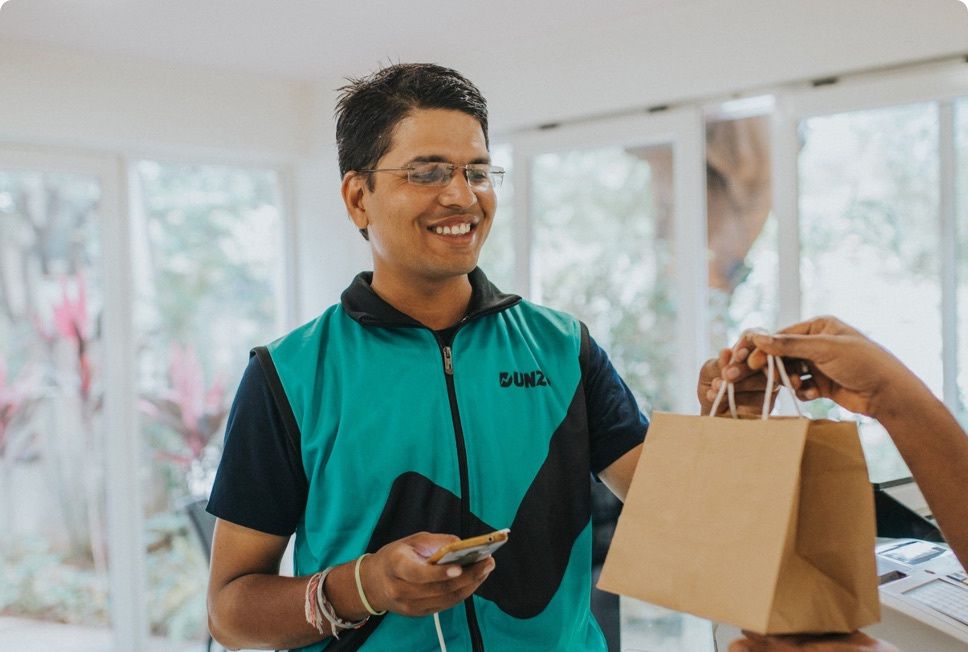Investors are pouring more dollars into Indian food e-commerce as the industry continues to see heightened demand amid the country’s continuing Covid-19 crisis.
Bengaluru-based Dunzo has just raised $28 million in the first tranche of a new funding round, with US tech giant Google and local impact fund LGT Lightstone Aspada the lead investors, according to Entrackr.
Also participating in this tranche are Indian investors Lightbox and Bhoruka Finance Corporation, US firms 3L Capital and Moving Capital, and Singapore-based family office Pivot Ventures.
The startup competes in India’s hyper-competitive food e-commerce space. Launching in 2014, it started out as a WhatsApp group connecting people to local services including grocers and restaurants. Since then it has evolved into a wide-ranging, app-based on-demand platform, allowing users to buy groceries and other goods and have them delivered to their doorstep.
According to AgFunder’s 2020 India Agrifood Startup Investing Report, Restaurant Marketplaces and eGrocery — two of the main food e-commerce categories, as defined by AgFunder — witnessed a sharp drop in funding last year after dominating foodtech investment over the past five years.
Together, the two categories accounted for close to 37% ($392 million) of the total funds raised by agrifood startups in India during the last financial year. This was down from 82% in the previous year, which had featured a handful of large outlier deals involving more mature players.
Smaller bets, differentiated models
Restaurant Marketplaces — mainly consisting of apps which allow users to order meals from third-party vendors — saw a massive 82% decline in investment. Nevertheless, it remained the single most-funded category in India, with $276 million secured across six deals.
The two biggest companies in the space, Swiggy and Zomato, raised $263 million of that total between them – with the latter netting the year’s single largest agrifood funding in India, banking $150 million from Chinese financial tech giant Ant. This, however, paled in comparison to the amounts they’d raised in previous years. A more pessimistic economic outlook, even prior to Covid-19, meant investors were less willing to pull out their checkbooks amid increasingly fierce competition, cash-burning subsidy wars, and thin-to-nonexistent margins.
It was a similar story in eGrocery, where the two dominant players — BigBasket and Grofers — didn’t score big-ticket investments on the scale they had during the previous financial year.
On the other hand, investors decided to place a few early bets on differentiated eGrocery models — including Dunzo with its ‘hyper-local’ focus. It netted almost $70 million across two rounds, making it the most-funded startup in AgFunder’s eGrocery category in India last year.
This latest capital injection led by Google and Lightstone Aspada shows that investors continue to see opportunity in the Bengaluru-based company’s approach.
However, it would appear that the Covid-19 pandemic has also had an impact, as consumers stuck at home increasingly turn to online ordering and on-demand delivery options to get food and groceries.
Stay-at-home and lockdown orders have gradually been eased off in many parts of the country. But at time of writing, India had just recorded the world’s biggest single-day spike in confirmed Covid-19 cases, with 77,266 infections and 1,057 deaths in one day. Many Indians are still trying to shelter in place and minimize contact with others where possible given these worrying numbers; and as long as that continues, demand for food and grocery delivery is likely to remain high.
Bigger BigBasket
Dunzo itself reported a tripling in demand for food products, beverages, and perishable goods during April this year, a month after the Indian government first implemented a nationwide lockdown in an attempt to stem the early spread of the virus. In May, it partnered with PepsiCo to help deliver more of the US brand’s products to Indian households during the pandemic.
Citing data from its internal brand intelligence team yesterday, BigBasket revealed it has experienced an 84% increase in new customers since March, with retention 50% higher compared to pre-pandemic levels.
Visits to its website and app were up 55% during the same period, while the number of households it serves has risen by 44%. Bbdaily — the platform’s next-day delivery service for daily essentials such as milk and fresh veggies — experienced growth of 139%.
The pandemic pickup for food e-commerce is not limited to India. As highlighted by AgFunder’s recently released Agrifoodtech 2020 Mid-Year Investment Review, eGrocery was the top-funded category worldwide between January and June this year, pulling in $1.8 billion across 76 deals and accounting for 20% of all agrifood venture funding. BigBasket was among the world’s top-funded eGrocery companies in H1 2020, raising $112 million across two rounds in April (just a little too late to make it into AgFunder’s India report.)
Meanwhile, Restaurant Marketplaces netted $960 million across 26 deals, and had the highest median deal value of any category at $20 million. Other foodtech categories that secured significant funding include In-Store Retail & Restaurant Tech, where businesses offering ‘contactless’ solutions and demand forecasting, among other things, attracted the interest of investors planning ahead for a post-pandemic world.
Got a news tip? Email me at [email protected]




